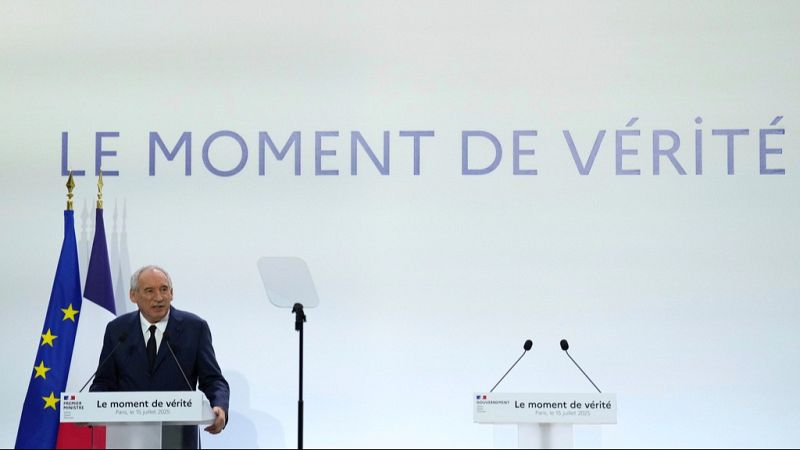A controversy has arisen in France regarding whether the nation’s citizens are working sufficiently, following Prime Minister François Bayrou’s proposal to eliminate two public holidays in order to enhance the economy.
The whole country must exert more effort in production and ensure that the nation’s overall activities are more impactful throughout the year, thereby improving France’s condition,” Bayrou stated during a press conference on July 15. “Therefore, I suggest that two national holidays be eliminated across the country.
For instance, the prime minister proposed eliminating Easter Monday, as it lacks “religious importance” in comparison to Easter Sunday, and 8 May, which marks the conclusion of World War II in Europe.
The suggestion has initiated a debate in French media and among online users regarding how France measures up against its neighboring countries in terms of public holidays, whether the French truly work fewer hours than other Europeans, and if eliminating these holidays would genuinely benefit France’s struggling economy.
Bayrou argues that eliminating two such days would generate tax income from economic activity, resulting in approximately €44 billion in total savings.
Nevertheless, the French National Institute of Statistics and Economic Studies has forecasted a 0.06% increase in the economy, if the prime minister’s initiative is implemented.
Official numbers from European Employment Services (EURES) reveal how many public holidaysResidents of European Union member countries, Norway, Iceland, and Switzerland have. Euroverify also reviewed data from theUK government.
When looking at these numbers, Cyprus stands out as the leader in terms of public holidays, holding the top position with 15 days. It is then followed by Bulgaria, Croatia, Iceland, Malta, and Spain, all vying for second place with 14 days each.
On the opposite side of the scale, we find Germany, Denmark, and the Netherlands, which have only nine public holidays. Nevertheless, when considering the United Kingdom as separate entities, England and Wales are at the lowest with eight days. Scotland has nine, while Northern Ireland has ten.
The comparison indicates that, with 11 public holidays, France is relatively average compared to other European nations, placing it alongside Greece, Hungary, Luxembourg, Slovenia, and Sweden. However, eliminating two days would place it among the countries with the fewest holidays.
Vacations may differ depending on the region and the specific year
However, in line with typical European practices, there are several conditions and exceptions regarding the number of holidays that specific countries observe.
For instance, numerous countries include areas that observe a varying number of public holidays in comparison to the national total. This is true in Switzerland, where various cantons have distinct bank holidays, some reaching up to 15.
The French areas of Alsace and Moselle also enjoy two additional days off compared to the rest of the nation, while the Portuguese islands of Madeira and the Azores have more days off than the mainland.
In some European countries, the number of public holidays can change from year to year, with certain places observing half-day breaks on specific public holidays. For instance, Iceland treats Christmas Eve and New Year’s Eve as public holidays starting from the afternoon.
Furthermore, although Euroverify has not included public holidays that regularly occur on Sundays, like Easter Sunday, in its ranking, the manner in which weekends align can still influence the total number of days off a country has.
For instance, France and other nations effectively forfeit a bank holiday when it coincides with a weekend, while the UK offers “alternative days” in such situations. In reality, this implies that employees will be granted time off on the following Monday or Tuesday if a public holiday occurs on a Saturday or Sunday.
Has any country in Europe ever removed a bank holiday previously?
The idea of eliminating two public holidays, as suggested by Bayrou, has historical examples in Europe, and this could offer some understanding of whether his strategy would be effective.
Recently, the Slovak government chose in June to discontinue granting 17 November (Day for the Struggle for Freedom and Democracy) as a public holiday, as part of a wider financial plan similar to the French suggestions. That day will, nevertheless, continue to be officially acknowledged.
In 2023, Denmark discontinued its Great Day of Prayer, which was observed on the fourth Friday following Easter, in an effort to enhance workforce productivity and military expenditure. Despite this, reports from the International Monetary Fund indicated that the change only led to a minimal rise in the nation’s Gross Domestic Product (GDP), ranging between 0.01% and 0.06%.
In 2012, the Portuguese government declared its intention to eliminate four public holidays in the subsequent year as part of an austerity initiative stemming from the financial crisis: All Saints Day on November 1st; Corpus Christi, which falls 60 days after Easter; Republic Day on October 5th; and the Restoration of Independence Day on December 1st, which marks Portugal’s independence from Spanish rule.
The days were meant to be put on hold for five years, with religious ones having been discussed with the Vatican. Nevertheless, in 2016, the newly elected socialist government restored all four holidays ahead of schedule, reversing a widely disliked decision.
It’s not solely focused on national holidays
Official public holidays are, naturally, just one indicator of the time workers in a European nation receive off.
Europe in Motion stated in March that Andorra, Malta, and Albania are the nations providingthe most mandatory annual leavethroughout the continent, with France also placing in the upper half.
Bulgaria offers the longest maternity leave in Europe, while Bulgarian primary school students receive themost school summer holidays— 15 weeks — in comparison with their neighbors.






